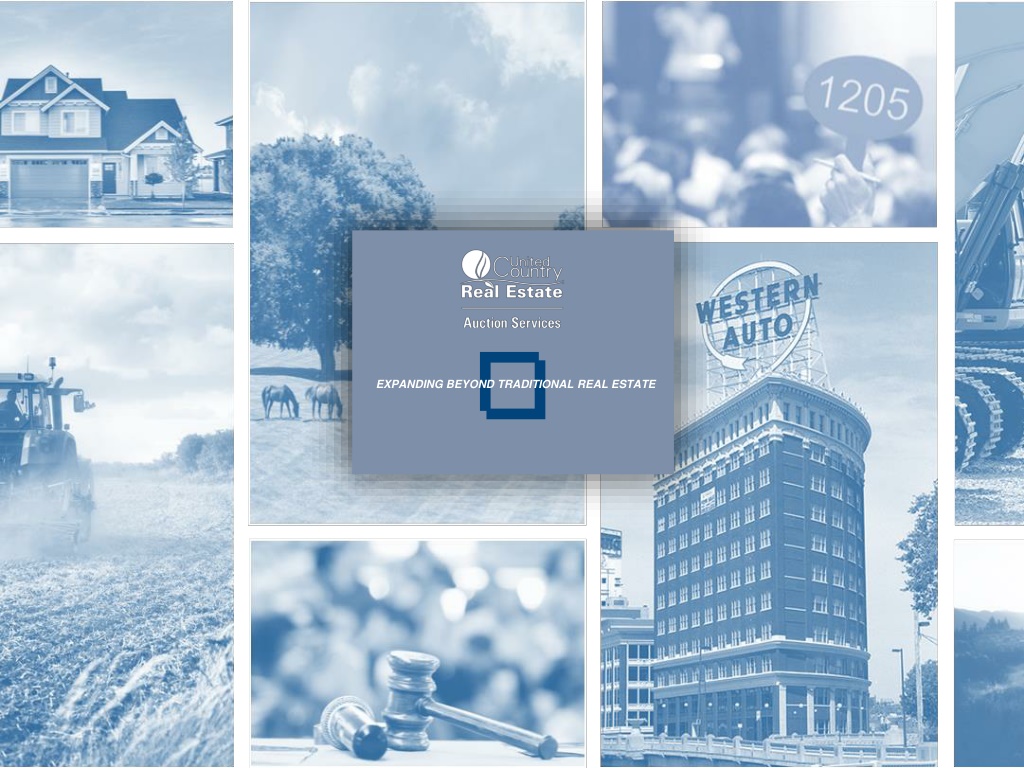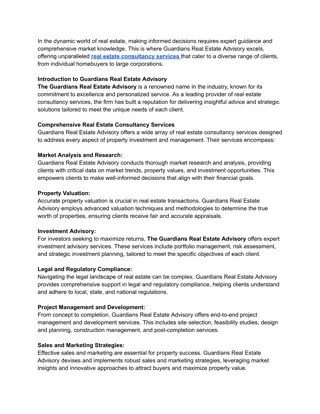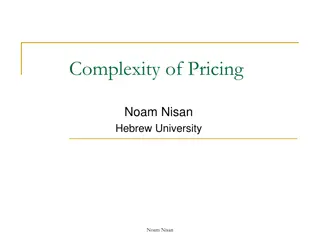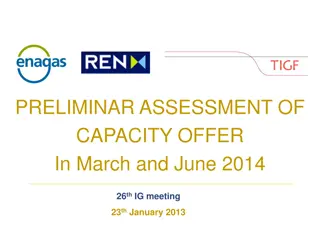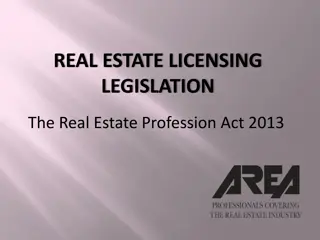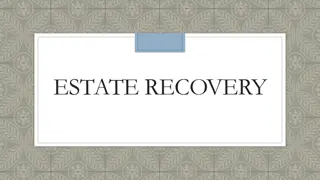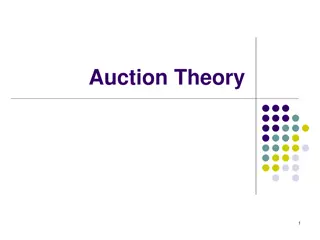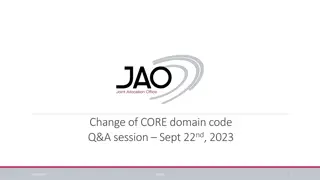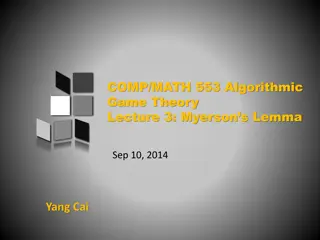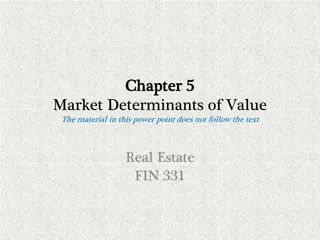Exploring the Benefits and Process of Real Estate Auctions
Real estate auctions offer various advantages for both sellers and buyers, such as increased market exposure, transparency, speed, and profit potential. Understanding different auction types, formats, and the auction process can help real estate professionals effectively navigate this method of selling properties.
Download Presentation

Please find below an Image/Link to download the presentation.
The content on the website is provided AS IS for your information and personal use only. It may not be sold, licensed, or shared on other websites without obtaining consent from the author. Download presentation by click this link. If you encounter any issues during the download, it is possible that the publisher has removed the file from their server.
E N D
Presentation Transcript
How Auctions Work Why Consider an Auction? Auctions offer clients and customers new options, enhance your image as a full-service professional, expose the property to a wide market of potential buyers, and turn profits for your firm. Seller Advantages: Greater Market Exposure Diminishes Holding Costs No Seller Commission Buyers Arrive Ready to Buy True Market Value Transparency Buyer Advantages: Certainty and Speed No Surprises Buyers Set the Price and Establish a Value More Choices Transparency & Fairness Auction Advantage Sales Person Advantages: List of qualified buyers New selling and purchasing options Seller Assurance Develop your own market niche Greater Exposure for property, you and your company Generate referrals and return business
How Auctions Work Auction Types There are two basic auction types. Absolute Auction and Reserve Auction. There are several distinct differences and benefits of the two and even a few common variations. The decision of which type of auction will best serve your seller depends on many factors that only your seller can answer. Absolute No reserve or minimum bid price that has to be reached to sell the property Reserve Seller is allowed to set a minimum bid or reserve price on the property
How Auctions Work Auction Formats The auction format dictates how you will present the auction to the public. Each format should be considered a different tool in the toolbox with each having its own merits and as costs. The decision of which auction format will best serve your seller s needs depends upon the seller s goals and timing & financial requirements, the property s size, value and presentation and the auction marketing campaign objectives. Onsite Auctions Properties are auctioned during a live event Online & Onsite Auctions Properties appear online and can be bid on prior to and during live event Online Only Auctions Properties are available to bid on online only Sealed Bid Auctions Bidders submit one bid in a concealed fashion
The Auction Process Qualifying an Auction Not every property & seller are good auction prospects. As a real estate professional, it is your job to understand what makes a good auction property & if your seller will be a good auction prospect. During the initial consultations, let the seller do the talking. Ask suggestive & leading questions to get the answers you need. You need to get them to tell you whether the property is even an auction candidate. You have the flexibility to present the property for sale in many ways. Listen to what they need then offer the right service for that need. If you do a good job of qualifying your seller, the property & methodology will fall into place. Step 1 : Determine Seller s Fit Step 2 : Assess Seller s Motivation Reason for wanting to have an auction Timing Requirements (when they NEED to sell) General Conversation (really listen to their answers) Step 3 : Understand Property Sales & Marketing History Step 4 : Establish Seller Expectations Marketing Expectations Obligations (debt, litigation, liabilities, etc) Pricing Expectations Step 5 : Confirm Property Information
The Auction Process Qualifying an Auction Disqualification Factors: Unrealistic pricing expectations Property is pending litigation Long listing period without price reductions Seller overbearing/hard to work with/difficult Seller has hired multiple qualified auctioneers & has been dissatisfied with all of them Unwillingness to give control to the Auctioneer Multiple past failed auction attempts Seller prediction of failure Unwillingness to provide upfront marketing funds Unwillingness to fix bad condition issues Determining seller has not disclosed significant property information
The Auction Process Auction Timeline Auction procedures might sound intimidating at first, but the process is actually quite simple. The timeline for an auction varies depending on what is selling, but a typical auction will be about 60 to 90 days from the initial client consultation to closing. Auction Listing & Marketing Agreements Approved By Seller Project Plan Finalized & Begin Execution of Marketing Bidder Information Packets Developed Closing Date Funds Dispersed Initial Client Property Inspection Periods Post Auction Reporting Auction Day Consultation 90 Days Prior to Auction 75 Days Prior to Auction 45 Days Prior to Auction 30 Days Prior to Auction 14 Days Prior to Auction Auction Day 3 Days Post Auction 30-60 Days Post Auction
The Auction Process How You Can Offer Auctions Refer a seller if you do not wish to be actively involved in the auction process, refer your seller to an auctioneer. When the seller completes a successful auction, you will receive a referral fee from a portion of the buyer s premium commission at closing. 1. Convert your listing - if you prefer to maintain the listing and be involved in the auction process, you and your client can both sign an auction addendum to your listing agreement that will authorize an auctioneer to conduct the auction marketing and sale. You will receive whatever commission you and your seller negotiated and the buyer s premium (auction commission) will be paid to the auctioneer by the buyer. 2. Register a buyer most auctioneers offer a buyer broker commission to any properly licensed real estate broker who signs in and represents a winning buyer that successfully closes on the property. 3. Attend auctions familiarize yourself with auctions in your marketplace 4. Hire an auctioneer home office & sales teams can help with proven Associate Auctioneer recruiting & retention tools 5. Become an auctioneer United Country has partnered with the best auction schools to provide you two different auctioneer training courses. The first though Professional Ringmen s Institute is dedicated to training and preparing individuals to serve the auction industry professionally and effectively as ringmen or bid assistants. The second option though America's Auction Academy, you will learn the skills and abilities essential to acting as an auctioneer, conducting auctions and operating an auction company. 6.
Auction Resources Available to United Country Affiliates Technology Web site development and support Search engine optimization (SEO) Auction entry software Personal property auction support Listing feeds to 3rd party sites Mapping integration as well as custom mapping software powered by MapRight National online auction platform powered by HiBid Auction management powered by AuctionFlex Global equipment auction platform powered by AuctionTime Marketing In-house marketing services firm Enhanced Marketing Solutions Strategic marketing-plan development and implementation Executive team consulting Foreclosure & REO solutions Digital marketing tools & templates Listing & selling tools & templates Discounted branded auction supplies through Kiefer Auction Supply Partnership with Global Auction Guide online auction advertising network) Training National Auction Summit United Country National Convention Regional training events Exclusive webinars on a variety of topics Online training tools & content Comprehensive tools & manuals Strategic planning tools
Learn More Important Links: UCAS Home on the Intranet UCAS Website Follow Us At: UCAS FaceBook Page UCAS YouTube Page The Sale Ring Podcast Contact Us: 1-800-999-1020 Auctions@UnitedCountry.com
